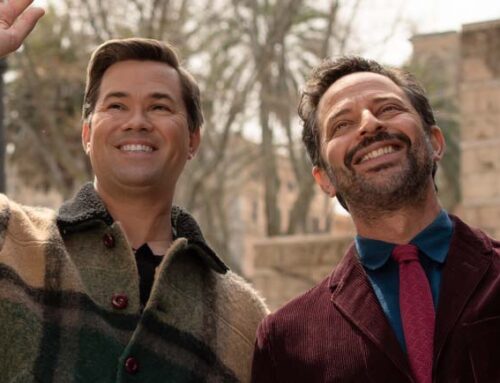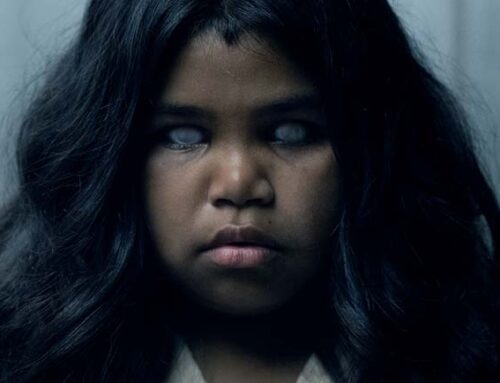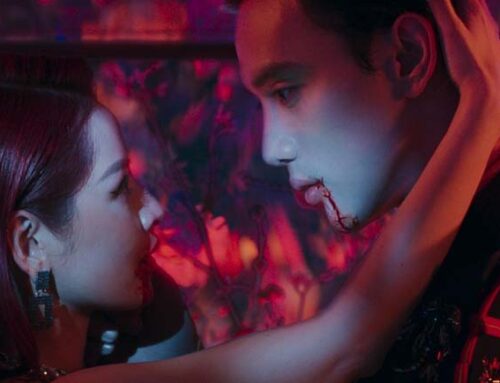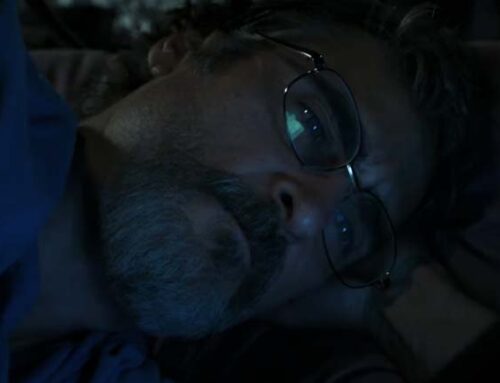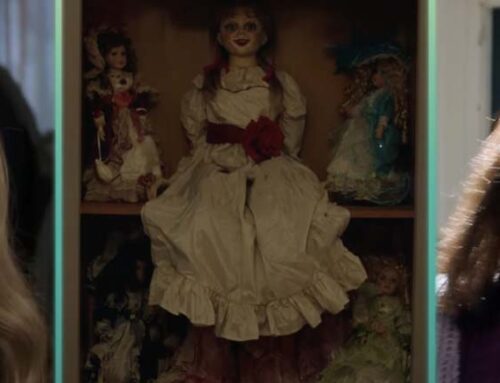Evil becomes all too real in Dread’s latest true crime horror thriller, Ed Kemper. Directed by Chad Ferrin, the film follows “The horrifying true story of Ed Kemper, a cunning and sadistic serial killer shaped by childhood abuse, whose charming facade masked his grotesque obsession with murder, mutilation, and the ultimate act of revenge against the woman who scarred him most—his mother.” Playing the title role of Edmund Kemper is Brandon Kirk, who is no stranger to the horror genre, having starred in Scalper, Pig Killer and Night Caller, all directed by Chad. When discussing collaborating with Chad, Brandon says, “He stands for his purposeful vision, whether that purpose be incisive messaging or entertainment or both, and it’s intoxicating to be around that. He’s a guy from Minnesota who makes completely nutso movies because it’s fun. What’s better than that?”
To coincide with the VOD release of the film, we spoke with Brandon about his work on the film.
-First off, what did preproduction look like for you on Ed Kemper? What sort of research did you do to get into character?
Of course going over all the interview footage repeatedly from 1981, 84, 91, 2002, documents, and documentaries from the U.S. and U.K. As well as listening to music from the time period of our story.
The #1 hit songs of 1972 & 73 were “The First Time Ever I Saw Your Face” and “Tie A Yellow Ribbon,” both romantic lovey-dovey songs which, if you’ve been locked up in Atascadero from adolescence to adulthood and are now hamstrung on the dating front due to your checkered past, those songs would exacerbate your isolation all the more. Even upon release from the facility, you’re still not really free in a matter of speaking.
And a February 1972 hit song was “Tiny Dancer,” made prescient and poignant by the following September’s tragic untimely passing of Ed’s victim Aiko Koo, a ballet dancer, played with elegant nuance in our movie by Erin Luo.
-There is a lot of documentation out there on Ed Kemper, did you watch any specific interviews or things about him?
In particular, a totem for me became what I suspect is far and away the most popular interview of him: The 1984 news interview. Which is 11 years after he turned himself in, but, bearing that in mind, I listened to it first thing every morning while keeping my deductive imagination malleable as far as, “Okay, so this guy about a decade before this, in the heightened circumstances chronicled in Stephen Johnston and Chad Ferrin’s screenplay, okay, right.”
There are several puzzling details just in that ’84 interview. Not the least of which are right at the very end. The interviewer asks where might Ed be if he’d never murdered, and Ed starts his answer with, “If my parole had been successful,…” No, Ed! Dude, you were on parole because you had already murdered. Killing your grandparents isn’t a freebie, it’s not a mulligan. Eddie, the question was “NEVER murdered.”
He goes on to say he’d be married with children, heading toward grandchildren. He’s 36 in that interview. If he’d been married at 21, had a child born when he was 22, that kid would only be 14 by 1984. Heading toward grandchildren eventually, but not any time soon. My best guess is he hastily lunged at an answer calibrated to project normalcy and to milk sympathy, but it was haphazard. It reminds me of how he’d later say in 1991 that, growing up, he’d always lived his life in lockstep without thought, with later remnants of that being we still hear him pronounce “puberty” like “pooberty,” and things like that. And we’re talking about a detail-oriented, diabolical mind with an assessed i.q. of 145.
Now, it’s a given that our top priority in terms of sympathy and ethics is the victims of his crimes, no doubt. That’s how we as a society should all view this, and it’s certainly the core commentary of our movie, which will reach more people by being populist genre fair that traffics in a thought-provoking center about our sociology, our global community, where we were, are, and should be. As we’re promoting our movie now, our cast member actor/activist Channy Crossfire included the hashtag #stopviolenceagainstwomen , which is spot on.
And at the same time, I confess I’m haunted by the wasted potential of this real-life criminal. With his intelligence, ingenuity, and drive that he used for evil, he could have made the world a better place instead of a worse one. It’s a tragedy albeit eclipsed by the greater one of the 10 souls robbed of all futures and choices at his hand. And though he’s gone on to help law enforcement Frank Abagnale-style, recorded audio books for the blind, etc., it doesn’t undo those atrocious transgressions, as the real guy would agree.

-You have worked with Ed Kemper director, Chad Ferrin, a few times before this film. What is your favorite part about collaborating with him?
It’s that he makes movies that he not only distinctly WANTS to make – a precious rarity in a field too often overrun by cold, lifeless commerce – , but that only he could make, which is invaluable. He’s a fearless filmmaker, bold, he takes risks with intentionality. He makes his filmic statements by audacious means, instead of merely conceding to what will go down smooth, safe, and forgettable. As with this movie for example, the viewer should be offended, because serial murder is irretrievably offensive indeed.
He stands for his purposeful vision, whether that purpose be incisive messaging or entertainment or both, and it’s intoxicating to be around that. He’s a guy from Minnesota who makes completely nutso movies because it’s fun. What’s better than that?
-What would you say are Chad’s strengths as a director?
Making you feel safe. I’ve said before I’ve found him to be a warm, reassuring presence on set. As a creative and as a person, he’s passionate with strong opinions, but on set he’s even-keel mellow-yellow and everything’s gonna be okay. Even when something regarding production falls through, he’ll pick up the slack himself with his own two hands to protect everyone from being any the wiser in the name of maintaining morale; he’s a wonderful leader that way, and he’s become masterful at it from having done it since 2000.
From a pragmatic standpoint, he’s a time and motion man. He’s a finish line crosser. He’s going to get it done: Make the day, make the film, lead us over the hurdle to our common goal. Obstacles are conquered, problems are solved as if they never were problems, he’s going to jiu jitsu a project into being. With ingenuity, flexibility. That’s how he’s so efficient and prolific.
-What was the hardest scene in Ed Kemper to film? Why?
First of all, I must specify the production process of this movie as an endeavor was Heaven on Earth to me. With our accomplished award-winning crew at the top of their game, Jason D’Alberti, Jeff Billings, Viktoriia Vlasenko, Veronika Golubeva, Yoni Coen, Silawn Lewis, Joe Castro, Matt Olivo, Sebastian Fernandez, Scott Parker. With an early review of the movie by Jim Cox praising “slick cinematography” and “some of the best visuals displayed in Chad’s work.”
In addition to the miraculously pinpoint accurate wardrobe department, Shon Le Blanc, Perry Ash, Geri Infante, Amanda Slate. With dead-on precise motor vehicles. And a cast both with accomplished greats like Brinke Stevens (BODY DOUBLE, THREE AMIGOS), Lew Temple (ONCE UPON A TIME… IN HOLLYWOOD), as well as incredible new talent from the indie short film circuit like Isabelle Morgan, Gloria Therese, Patty Hayes. Incredible. Unreal. It was a great honor that I cherish.
Now, to answer your question, the closest thing to a scene being hard was something I might have only imagined. Terrific, formidable actor/financial entrepreneur Autumn Rose Ruch who plays Cindy Schall was both a delightful hang and she’s perfect in the movie, like ingenue-era Cybill Shepherd. But when we were shooting, Chad felt a bit of the scene as written was too static, so he streamlined it a bit. Again, I may be falsely projecting onto the situation, but I’ve been in the situation Autumn was in, where you’re playing support in an independent film, you’re vulnerable, you don’t know if you’re going to get cut out or side-shoved in the proceedings. So I thought I perceived disappointment in Autumn, which was heart wrenching.
But, as I say, Autumn completely pops in the movie, she owns it when she’s on screen. Chad’s instincts about pacing and keeping a viewer engaged were right, and it’s irrelevant that Autumn’s scene in the movie isn’t how it initially was on the page. I don’t know, Autumn might not even have cared either way; she’s a multi-faceted, industrious person with a lot going on.

-You have starred in a lot of horror films. What attracts you to this genre?
It’s cathartic to repurpose fear into an adventure.
-Cameron Britton also played Ed Kemper in Netflix’s Mindhunter, for which he received a Primetime Emmy award nomination. Did you speak with him at all before production began to get any advice?
This is the first time I’ve been asked this specific question. Firstly, I suspect he’s too busy winning Gold Derby Awards to associate with obscure ol’ me. But I understand why you’d ask due to his beautiful reputation as a nice guy, as well as how social media can allow accessibility between different strata of people. Also, I made a solid decision for my preparation to focus exclusively on material involving the real-life Edmund Kemper, since there’s so much of it, and because going straight to the source seemed like the way to go for our project.
I didn’t even watch Mindhunter before we finished filming our movie to avoid falling into the possible trap of doing a copy of someone else’s portrayal. Also, we portray different time periods and contexts of Kemper. Only recently have I started to watch a couple episodes of the show, and oh my god, the hype is true. Cameron Britton is phenomenal at creating a grand presence. Like H.A.L. the super computer from 2001, Vito Corleone, Hannibal Lecter, he’s this captivatingly ominous being to which characters go for knowledge/counsel. My ideal pipe dream for an interaction with Cameron Britton would be for him to tell me his entire unfiltered top to bottom account of his involvement with being in the movie A MAN CALLED OTTO.
-Can you tell us something about you we might not know?
Hahaha, well, no one knows anything about me. The very talented Silvia Spross who plays Dr. Fillmore in our movie, we crack up all the time about how no one who watches or even works on these movies ever knows the guy who plays Ed Kemper is the same guy who plays Sturges the German inmate in UNSPEAKABLE: BEYOND THE WALL OF SLEEP and plays Kotto the homeless man in SCALPER and plays Reeves the head-shaved cultist in THE OLD ONES, etc. It’s the best part of being unknown.
-What are some of your favorite horror films?
US. I relish Lupita Nyong’o’s character work with that breathy, atonal creaky voice. And what I perceived as a thought-provoking metaphor about the first world versus the third world, but I may have misinterpreted that ’cause I’m a dope. IMPURATUS transfixed me; thought director Mike Yurinko made a handsome, stately, engrossing slowburn period piece.
PSYCHO is an obvious but true answer. Don’t know if MISERY counts as horror, but wow it’s so incredibly good. Always loved it. My sister and I have quoted it since we were kids. Director Rob Reiner plays the viewer like a fiddle, it’s so entertaining, James Caan puts on a clinic doing thoroughly organic stuff, and Kathy Bates is one of my all-time favorite actors based on that performance alone. I love the character Annie Wilkes. The way Bates plays the character and the way it’s written, exquisite greatness preserved in time forever. I think the secret sauce with that character is how she’s so close to just being a cool lady who could be nice to hang out with. She likes her books, her sow, if it wasn’t for that little screw loose. Confession: At some point after getting cast as Ed Kemper, I remembered MISERY and thought in my silly deluded head, “Ohhh yyyes, I did it! I’m cockadoody!”


